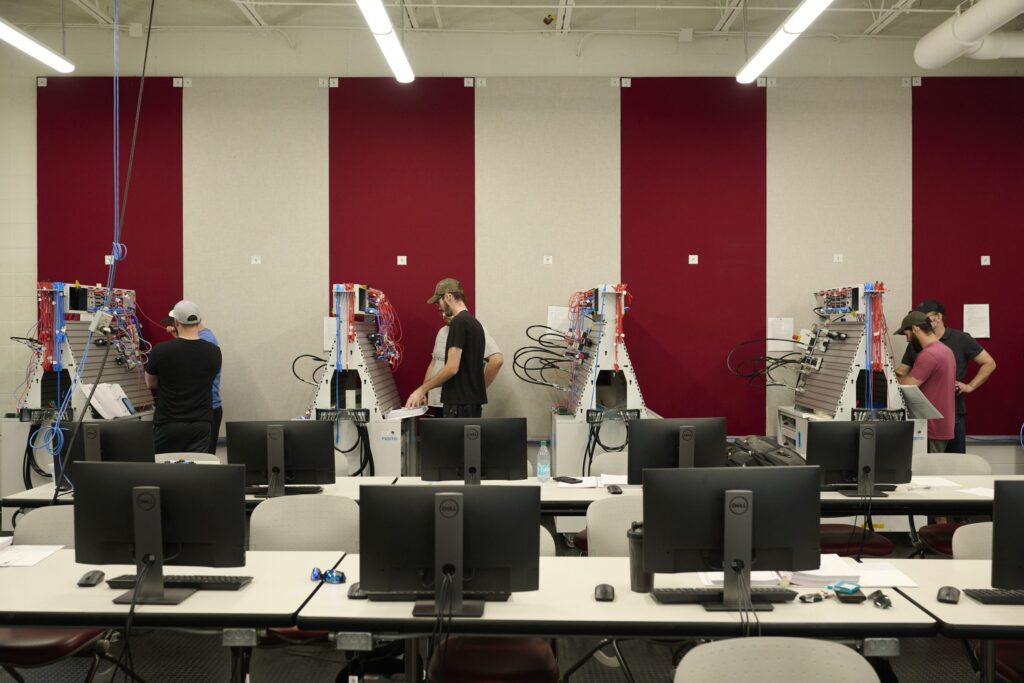ELYRIA, Ohio — Nolan Norman, a student at Midview High, embarked on an unexpected journey into microelectronic manufacturing when his adviser suggested a new class. Initially unaware of the field, Norman quickly became fascinated by the process of fusing metal to circuit boards. Despite his previous aversion to college, he enrolled in Lorain County Community College’s microelectronic manufacturing bachelor’s degree program. Over the summer, he gained valuable experience working in the field, earning college credits and $18 an hour. “Now I’m seeing the path to get to be one of these wizards,” Norman remarked.
Two years ago, Lorain County Community College collaborated with Midview High to introduce the course, part of their strategy to attract and train young talent for manufacturing jobs. Across the nation, over 400,000 manufacturing positions, many requiring advanced skills and credentials like those Norman is pursuing, remain unfilled. President Donald Trump’s tariffs aim to boost U.S. manufacturing jobs, including those in advanced fields like robotics.
Despite the demand, educational institutions face challenges in adapting training to meet employers’ needs. In the vicinity of Lorain County Community College, officials estimate they need to educate four times more students to fill existing job vacancies. Meanwhile, Gogebic Community College in Michigan suspended its manufacturing program due to low enrollment, highlighting the rapid evolution of industry needs, as noted by registrar Karen Ball. Manufacturing in regions like the Great Lakes experienced significant job losses in past decades, yet there’s been a gradual recovery, climbing from 11.5 million jobs in 2010 to 12.9 million today, according to the Economic Innovation Group.
In response to the evolving landscape, Lorain County Community College has partnered with local high schools and organizations to promote its manufacturing programs. Efforts include hosting informational tables at community centers and collaborating with a local nonprofit to engage high school students using holograms and a robot dog. Such initiatives have resulted in an increase in graduates in fields like industrial engineering, welding, and microelectronics, from 43 a decade ago to 120 annually.
The college also works closely with local employers to tailor its curriculum and offer relevant training. For example, Ford Motor Co. sends apprentices to Lorain for hands-on classes on fluid power applications. Tyler Tector, one of the apprentices, expressed confidence in the job security offered by robots, noting the need for human technicians to maintain them.
Lorain’s efforts align with a broader shift in community colleges towards frequent collaboration with companies to understand their evolving requirements. The college’s approach includes offering internships and flexible class schedules to accommodate students’ work commitments. Johnny Vanderford, who leads the microelectronic manufacturing program, highlights the college’s partnerships with over 90 manufacturing companies to align training with workforce needs.
While colleges like Lorain have made strides, challenges remain. Rapid changes in employer demands and limited student interest have led to program adjustments. Lorain recently streamlined its fast-track offerings and phased out an industrial safety program due to insufficient enrollment, despite job market needs. However, initiatives like Workforce Pell, allowing low-income students to use federal grants for short-term programs, promise future support for manufacturing education.
In Ohio, the anticipated Intel chip manufacturing plant in Columbus is expected to create thousands of jobs and has spurred investment in local workforce education, including a $2 million contribution to Lorain County Community College. Students in Lorain’s microelectronic manufacturing program often secure internships at Intel’s Arizona plant, motivating them to excel. Lia Douglas, a program participant, shared insights from her internship experience, emphasizing the importance of broader skills amid industry uncertainties.
“`
—
Read More Kitchen Table News










